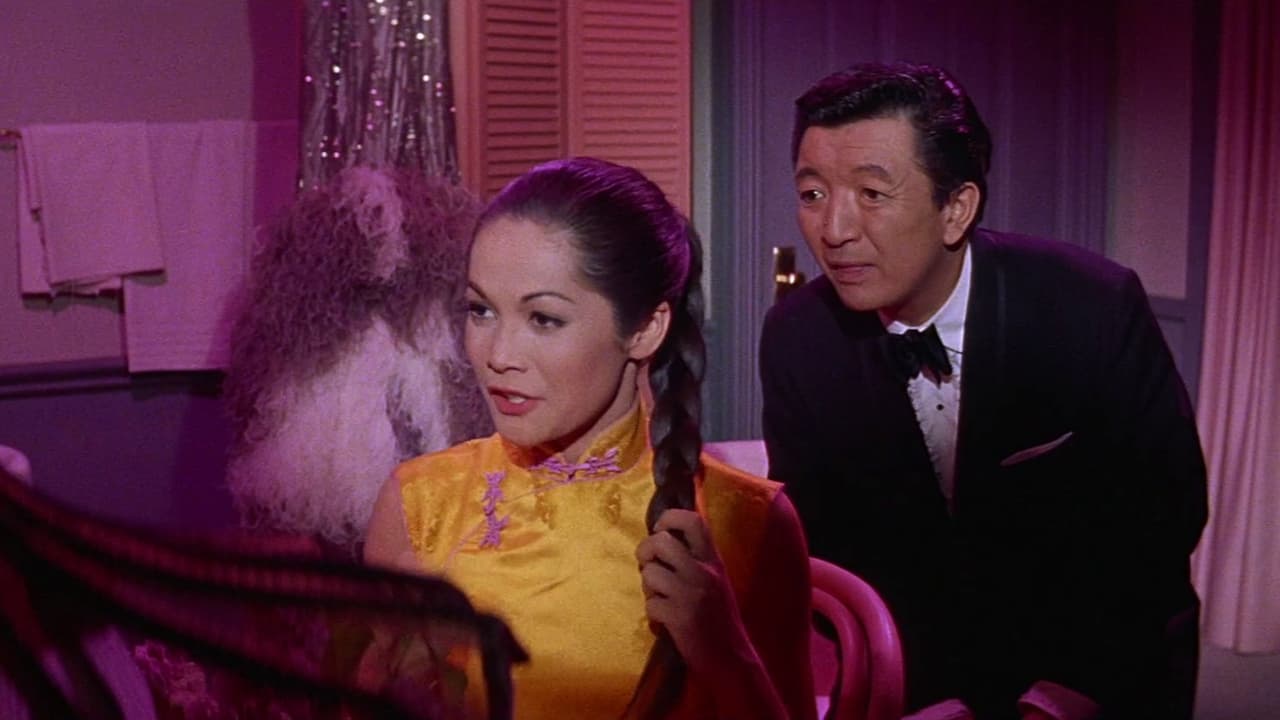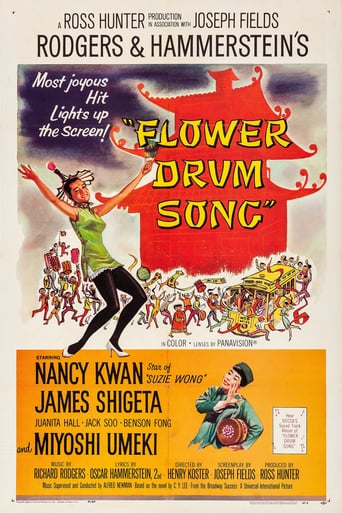WillSushyMedia
This movie was so-so. It had it's moments, but wasn't the greatest.
PiraBit
if their story seems completely bonkers, almost like a feverish work of fiction, you ain't heard nothing yet.
Keira Brennan
The movie is made so realistic it has a lot of that WoW feeling at the right moments and never tooo over the top. the suspense is done so well and the emotion is felt. Very well put together with the music and all.
Kayden
This is a dark and sometimes deeply uncomfortable drama
tavm
I had originally watched this movie in the '90s when I lived in Jacksonville, FL. So last night, I showed this on DVD with my mom viewing it with me. She had never seen this before so she managed to enjoy it just as much as I did watching this again. During my original viewing, I had a problem with Wang Ta's going from Linda Low to Mei Li since Linda was teasing him and Mei Li was too reticent for my tastes which meant I would have preferred he have gone with Helen. Part of me still feels that way but I'm now used to the way things eventually worked out so I'm now okay with that. Anyway, like I said, I enjoyed this much better the second time around especially with the great look presented on the DVD. Loved the cast of Nancy Kwan, James Shigeta, Miyoshi Umeki, Reiko Sato, Benson Fong, Juanita Hall, Victor Sen Yung, Patrick Adiarte (like me and Mom, a Filipino), and especially, Jack Soo! In fact, one of my favorite sequences was his being knocked out twice in the "Sunday" number! I also loved seeing the cowboy and Indian-in black and white-cavorting with the Technicolor players in that one. Oh, and what a great way in presenting multiple Nancy Kwans in the "I Like Being a Girl" number. The Rodgers & Hammerstein score was really good. Really, all I'll say is I highly recommend this film version of Flower Drum Song.
mark.waltz
And make sure you head down to Grant Avenue, 'cause the girl who brings your food is another tasty dish! Some critics called this (one of the few musicals to focus on Asians) "A World of Woozy Song", but if there is anything woozy about it, I certainly didn't feel it. In fact, I think this (after "Carousel") is perhaps one of Rodgers and Hammerstein's loveliest scores, and certainly as profound as "South Pacific" and "The King and I". But with a song like "Love Look Away", you have one of the most heart-wrenching ballads in a Broadway show, sung tenderly by a rather minor character you truly feel empathy for. "A Hundred Million Miracles" is certainly filled with indefinite promise, and "Chop Suey" gives us a taste of what Americans have taken from the Chinese culture and transformed into their own flavor. Long before "Kids" from "Bye Bye Birdie", there was "The Other Generation", sung first by the adults who certainly don't understand the teens then later by the teens who have become Americanized and don't understand the adults, new Americans from another country. "I Enjoy Being a Girl" would also be re-formatted for "Birdie" as "How Lovely to Be a Woman". Unlike the rock and roll world of "Birdie", this is a definite salute to the changing traditions of Asian Americans (or any offspring of immigrants from any culture), it combines modern dance trends and the cultural influence on the young from their more traditional seniors. Like the Puerto Ricans of "West Side Story", all these youngsters want is a chance, and that is a theme that any culture can identify with.A decade ago, someone came along and turned "Flower Drum Song" into a shell of itself with a "revisal" story for Broadway that was part "Cinderella" and more woozy than Goldilocks after eating the porridge. Claiming that some of the original portrayals of Asian Americans were "offensive", they took out the family element of the original source, which defeated the whole purpose of the generational conflict. Even by giving its heroine a "Miss Saigon" type drama with her escape from Communist China, the remainder of that revival cheated itself in spite of an interesting prologue that ended up being more "stereotypical" by totally changing the structure of the established characters.Miyoshi Umeki plays the young "wetback" (as she refers herself to be in an amusing manner) is an innocent young girl amazed by the differences she finds, and loves her new home. Then, there's sassy Linda (a fun Nancy Kwan-the Chinese Rita Moreno) who knows she's adorable and enjoys it tremendously. The difference between shyness and sassiness makes their acquaintance really sweet as well as those of the men they love.Then, there's the older generation, lead by Benson Fong and Juanita Hall, repeating her Broadway role, and unlike the movie version of "South Pacific", getting to sing as she had on stage. The light-skinned African American Hall is the heart and soul here, as she was in "South Pacific". I've heard some critics called this generation a dated view of the Asian culture but anybody of a certain age can certainly identify with how the different generations relate. Patrick Adiarte as the baseball playing teen, adds a nice charm to his teen-aged character, having already gone down Rodgers and Hammerstein territory with his performance as the prince in "The King and I" on screen. (Years later, he would enter TV immortality as the Hawaiian acquaintance of Greg on "The Brady Bunch".) Reiko Sato, who sings the haunting "Love Look Away", is only on screen for a few minutes, but will steal your heart. Jack Soo ("Hawaii Five-O", "Thoroughly Modern Millie") adds some humor to his performance of the rascal who begs the sweet Umeki "Don't Marry Me". The lavish production really helps make this a fun movie experience, which unfortunately the Rodgers and Hammerstein organization have sold short thanks to pressures from outside groups.
fantasiland
I don't think this movie was really up to par with other R&H movies. The songs were just O.K. and to be honest Mei Li was one of the worst characters in the whole movie for me. Mei Li had no personality whatsoever. Throughout the whole movie, she was just a Mary Jane- hardly the right personality for a main character! As for Linda, she has no dreams or goals besides being a fifties housewife. But, now that we think about it, isn't that what Mei was going to do to? Oh, yeah. So Mei Li is like Linda, except with less personality. The one possible character who had hope in becoming three-dimensional with real thoughts and feelings was the supporting character who didn't get a happy ending, Helen Chao. In the book version she commits suicide, in the movie version she just disappears! She selflessly took the heartbroken Ta to her house to have a place to sleep, and then he leaves her, without even trying the breakfast she made for him. Mei comes later and jumps to conclusions and by then we all know how the movie ends. And that's it. Helen, a poor seamstress, the childhood friend of Ta, arguably the most self-sacrificing character in the movie, just disappears from the story line. Okay, so was it really that necessary to make Helen in love with Ta, too? I didn't read the book, but I hope it was for more than an excuse for a musical number. So in the end, everyone (meaning Sammy and Linda and Ta and Mei) is happy and married, while poor Helen rots away in heart ache and nothingness. Her character had so much potential. She knew Ta for so long and she obviously cared for him before Mei or Linda came along- Linda wanting Ta to make Sammy propose and Mei because she needed a wealthy husband. Now, tell me, who cared the most for Ta, considering all their initial motives? Oh, that's right- Helen. Except, thanks to R&H, she's gone. If given the option, I wouldn't watch this movie again.
Amy Adler
Wang Ta (James Shigeta) has just graduated from college and has returned home to Chinatown in San Francisco. His father is definitely "old school" in that he dresses like a Chinese native, despite his very successful American business. Wang is contemplating law school but, in the meantime, his head is turned by a beautiful local gal named Linda (Nancy Kwan). Unaware that, first, Linda is a showgirl at a local restaurant, and, second, that his father is arranging a match between himself and a lovely girl from Hong Kong, Mei Li (Miyoshi Umeki), Wang continually tries to keep his father at a distance. But, naturally, when Wang's dad gets news that his son has his eye on another girl, he makes it clear that he, dear old dad, is in charge of Wang's life. This does not go over well, despite Wang's recognition that Mei Li is a wonderful, attractive lady. Linda, too, has a few secrets; she is merely making a play for Wang Ta because her own boyfriend, restaurant owner, Sammy, will not give her a ring, after FIVE long years! How will the "song" end for everyone? This film, based on a Rogers and Hammerstein musical of the fifties, has some good elements. The musical numbers are light and catchy, and the performers are great, especially the handsome Shigeta, the knock-out gorgeous Kwan, and the shyly beautiful Umeki. Then, too, it gives the viewer a glimpse into the Chinatown of the fifties and sixties. But, having said that, it is definitely a politically incorrect piece of fiction, with many stereotypical elements about Orientals. One would wonder how it was received by Chinese-Americans long ago and how they would regard it now. As for being dated, it is truly no more so than any other film from the time period, such as Gidget or Beach Blanket Bingo, but its goal to be "hip" to the modern culture is amusing in the 21st century. Nonetheless, if you love musicals or light romance, you will most likely enjoy it. Drum up some like-minded friends and plan a Saturday night get-together, with take-out Chinese, naturally, on the menu.

